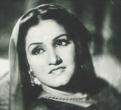


So the Madam is no more. For on 23rd December 2000, Malika-e-Tarannum Noor Jehan took her final bow from world stage. One more star that glittered brightly for years, disappeared behind the curtain of time. After all, men are mortal. But what about the melodies? Aren’t they immortal?
‘Mortal Men, Immortal Melodies’. That was the program which brought Noor Jehan into my life. Till then, I wasn’t even aware of her musical identity. She was just a name- distant and alien. February 11, 1982- Noor Jehan returned to India for the first time after the Partition. The famous Shanmukhanand Hall in Mumbai witnessed an unprecedented rush of music-lovers. They just wanted to catch a glimpse of the ruling melody queen of Pakistan, who also represented the golden and glorious past of Hindi cinema. Celebrities were falling over each other to meet and greet her. News-papers were full of her stories. Nostalgia was in air.
“Noor Jehan-ji, aap jitney baras hum se door rahi hain, theek utne hi bras humne aap ka intezar kiya hai.” (All these years that you were away, we have waited for you- counting each year as it passed by.) I still remember those dramatic words Dilip Kumar- the hero who was her co-star in Jugnu- delivered in his inimitable style at that function. Noor Jehan had then mesmerized the audience with her masterpiece Aawaz De Kahan Hai/ Duniya Meri Jawan Hai and the years that passed in between melted away in a flash. She was not just a name any more. She had become part and parcel of my musical sensitivity. I started going back in history to know more about her.
She was born on 21st September 1926 in Kasur- a town in Punjab and was originally named Allah Wasai. Dewan Sardari Lal – a thetare financer, took her to Calcutta along with her two sisters – Eiden Bai and Haideri Bano. Three sisters shot to fame as stage singers and Allah Wasai who was just six then, acquired a new name – Noor Jehan. This was the name that was destined to rule the hearts of countless admirers.
From stage to films was but a small step and soon director K.D.Mehra presented the musical sister trio in his Punjabi film- Pind di kuri, where Noor Jehan sang her first film song. It was in Gul Bakaoli (1939) that she made her mark with Shala Jawaniyan mane, a tune crafted by master composer Ghulam Haider. He was the one who really honed her singing skills and brought her talent to the fore.
At the age of sixteen, Noor Jehan starred as the heroine in Khandaan (1942). As an actress she had little to offer other than her stunning beauty but as a singer she was class apart. Ghulam Haider was again the composer here and songs like Tu kaunsi badli mein, Mere liye jahan mein, Meri ammi ka raaj bhala and Aankh michouli khelenge established Noor Jehan as singer with a rare gift of making emotions come alive.
Next five years saw her zooming to the top as a singing actress in Mumbai’s Hindi film industry with hits like Village girl, Badi maa, Anmol ghadi and Jugnoo. Maestroes like Sajjad, Shyamsundar, K.Dutta and Naushad created many a memorable song for her like Badnaam mohabbat kaun kare, Kis tarah bhoolega dil, Diya jalakar aap bujhaaya and Aawaz de kahan hai. Such was her influence that a budding prodigy like Lata Mangeshkar also followed Noor Jehan’s style to the T in initial phase of her career. Both these melody queens were to share a special rapport all throughout their illustrious careers.
1947 Partition saw Noor Jehan migrate to Pakistan and within no time, she conquered the top spot in the film industry there, first as a singing heroine in the Fifties with films like Dupatta, Gulnar, Intezar and Anarkali and later on purely as a peerless playback singer. Folk, ghazal, geet – she sang them all and sang all of them with distinction. Songs like Chalo acchha hua tum bhool gaye, Mera laung gawacha, Chandani raatein, Sur sangeet ki jogan banke and Hamari saanson mein aajtak are simply unforgettable. Her resorting to cheap, vulgar, double entendre songs latter in the career was a forgettable chapter. Till the end, she remained a natural singer with little refined technique and a lot of raw rustic feel which was so endearing.
Her personal life always remained shrouded in controversy – her romances, her marriages, her divorces, her on- off relations with political establishments- all just proved one thing – she was just a human being – a mere mortal like all of us. A mere mortal who left for us a treasure of immortal melodies! A talent like hers cannot remain confined within borders!